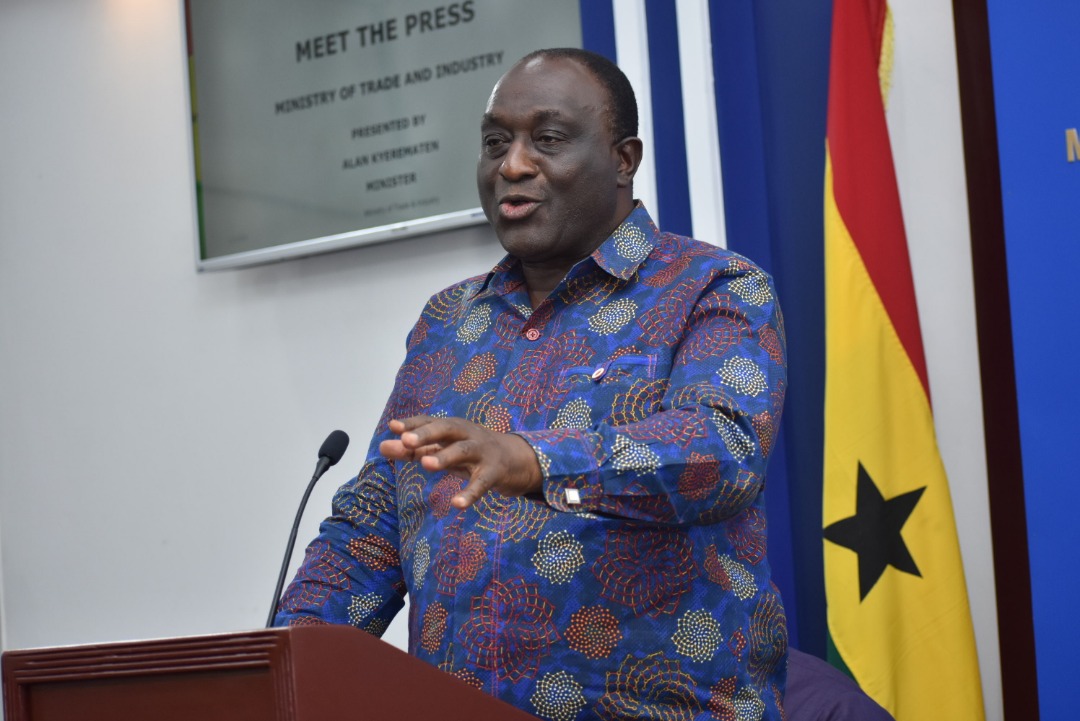
Govt to support large-scale production of Kantanka vehicles
The government is to lay out a comprehensive programme to support the Kantanka Automobile Company Limited to produce vehicles fit for the African market.
Taking his turn at the Meet-the-Press series in Accra yesterday, the Minister of Trade and Industry, Mr Alan Kwadwo Kyerematen, said the government was determined to support the company to supply more vehicles to the local market and also export to other African countries under the African Continental Free Trade Agreement.
He said any item produced in Ghana "has a premium value" in other African countries, and so Kantanka vehicles would enjoy high patronage.
"You will see what benefits the Kantanka brand will have," the minister said.
No fears
Mr Kyerematen allayed fears that the government's decision to allow international automobile companies, such as Toyota and Nissan, to establish assembly plants in the country, would cripple the business of Kantanka.
Rather, he said, the government would provide the needed environment and incentive for Kantanka to produce more to feed the local market and be competitive in exporting to other African countries.
Kantanka Automobile Company Limited is a subsidiary of the Kantanka Group of Companies, founded by the founder and leader of Kristo Asafo Mission of Ghana, Apostle Kwadwo Safo Kantanka.
The company is into the manufacturing of automotive components and their combination with other parts outsourced from component suppliers to form a complete built unit.
The Kantanka range of cars, which is made up of saloon and four-wheel cars, include Kantanka Nkunimdie SUV, Kantanka Omama Pickup, and Kantanka 4x4 and Pickup/SUV.
Strategic anchor industries
Touching on other policy areas, Mr Kyerematen said the government had initiated a policy to establish strategic anchor industries to diversify the country's exports and introduce new growth poles for the economy.
He said key strategic industries under the initiative were integrated bauxite and aluminium industry, iron and steel, petrochemical industry, vehicle assembly and automotive industry, pharmaceuticals, industrial chemicals, garments and textiles.
The
Mr Kyerematen mentioned Toyota, Volkswagen, Renault, Nissan, Suzuki and Sinotruk as the top global original equipment manufacturers ready to invest in Ghana this year.
"An Automotive policy has been approved by Cabinet to be launched soon. Automotive Standards and Homologation have been developed for public consultations", he said.
One District, One Factory
On the One-District, One-Factory (1D1F) programme, Mr Kyerematen said 57 companies/projects were currently in operation; 22 projects were under construction, 33 projects were ready to commence implementation before the end of 2019 to be financed by local private financial institutions, and 56 projects were ready to commence implementation before the end of 2019 (small-scale processing facilities, financed by AfDB).
Also, he said, five projects were ready to commence implementation before the end of 2019 (common user processing facilities, funded by AfDB) and eight projects were ready to commence implementation before the end of 2019 (financed under the CNBM facility).
He said a total of 181 companies were engaged in the 1D1F. They comprise 129 new companies and 52 existing companies that had been incorporated into the 1D1F programme.
Giving the regional distribution of the ongoing projects, the minister said 23 were in the Ashanti Region, seven in the Bono Region, five in the Bono East, three in Ahafo; 12 in Central; 15 in Eastern; 11 in Greater Accra; four in Northern; three in North East; three in Savanna; four in Upper East; four in Upper West; six in Volta, one in Oti, five in Western and four in Western North.
In terms of percentages,
Tax and other incentives
Mr Kyerematen said companies under the 1D1F would enjoy a five-year tax holiday, exemption from import duties, taxes and levies on equipment, machinery and parts; exemptions from payment of duties and levies on raw materials, and exemptions from payment of withholding taxes.
The non-tax incentives included repatriation of dividends, guarantee against nationalisation, expatriate worker quota and facilitating access to land, energy, roads and other infrastructure facilities.
Industrial parks
Mr Kyerematen said the government was supporting private sector investments in establishing at least one industrial park for each region.
He said so far, nine parks in four regions were at various stages of implementation, including the Tema Export Processing Zone and the Greater Kumasi Industrial City.
